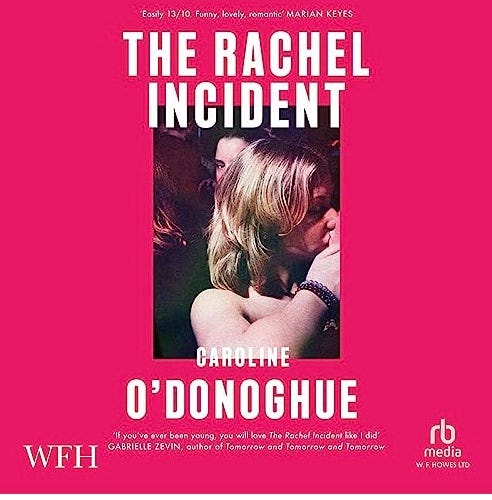BookLife Review by Carol O'Day: The Rachel Incident (Caroline O'Donoghue, author)
Cork, Ireland, 2008 Recession, coming of age, reproductive rights, gay rights, friendship, finding love, transitioning from college to adulthood, publishing, journalism, youthful indiscretions.
The Rachel Incident is a contemporary fiction, coming-of-age novel that relies on an odd disconnect between satiric and off-hand tone and weighty social justice issues. Rachel is a college student majoring in English literature and working in a bookstore to pay her school fees. Her parents, both dentists, have fallen on hard times during the Recession, when cosmetic dentistry in Cork, Ireland became an unaffordable luxury for most and their reduced income had no room for college tuition. At the bookstore, Rachel meets and befriends James, a young closeted gay man who does not attend college and is in many ways in search of himself.
The Rachel Incident takes on two weighty issues that operated on a delayed awakening clock in Ireland in 2009-gay rights and reproductive rights. Gay men were not readily or regularly out in Ireland at that time, and abortion was still illegal there. James and Rachel move in together and become inseparable best friends. She knows he is gay, though initially he is not out or open about his sexual preferences. Their friendship is intense and insular. Rachel develops a crush on a married professor, Dr. Fred Byrne, and is shocked when she finds Dr. Byrne and James entangled in a passionate embrace in the bookstore stockroom. Their friendship survives and their apartment becomes a hideaway for James and Fred. To complicate matters further, Rachel takes on a job as an assistant to Dr. Byrnes’ unwitting wife, a publishing agent.
Later Rachel collides with another James, who will be called Carey, his surname, because, as Rachel tells him when they meet “There can only be one James.” With Carey she finds deep passion and connection and experiences true love. Theirs is a complicated relationship. Carey is flakey, a bit aimless (a function of his attention deficit disorder) and deeply committed to his family who lives in Northern Ireland. He is unsure whether his feelings are reciprocated and breaks Rachel’s trust by one prolonged cellphone-less absence.
While out of sync with Carey, and not ready to raise a child, Rachel finds herself pregnant and crashes up against the prohibition of abortion in Ireland, and without funds to travel to England for the procedure. She devises a less-than-honest method to secure the funds for her trip to England and James’ assurance that he will accompany her. Though the situation resolves, Rachel is nonetheless ostensibly traumatized by the experience, and later builds a career in journalism on the issue of reproductive rights.
Throughout the novel Rachel and James support one another’s financial and romantic challenges in the unquestioningly complete way that best friends do, even when their respective interests diverge. Their friendship at times impedes each in advancing into other adult relationships but is unyielding. They are firmly and thickly in the mess of growing into adulthood and the consequences of the impulsive actions of not-quite-adults.
O’Donoghue’s writing is crisp and witty, and it is at its best when she is mired in the daily indignities of adulting that confront twenty-somethings in the Recession and post-Recession eras. Though nothing is simple, scarcity can be the mother of innovation and ingenuity. Yet, the novel suffers at times in the contrast between the levity and laissez-faire tone of naive twenty-somethings and the seriousness of the hardships presented by the laws that restrict their personal freedoms–gay rights and reproductive freedom. O’Donoghue is not cavalier, exactly, about the issues her characters confront, and she does convey the oppressiveness of facing such hardships without financial resources. At times the witty examining-of-navels that is the stuff of coming-of-age, and the culture of “whatever” contrasts a bit too starkly here with the life-altering choices and decisions thrust upon these characters in an unforgiving environment. That O’Donoghue’s characters are affected by these injustices is clear, but that they are so able to deflect or shelve the issues in favor of their everyday decisions about what 5-euro bottle of wine to choose, or what dvd to watch in the all but unheated apartment the protagonists share is unsettling. Perhaps Rachel and James are precisely the norm, and the point. The very real hardships of life on the fringes are not pretty. Life marches on, and even in distress, laughter may be preferable to despair.
Support local bookstores and BookLife: Reviews for Readers by purchasing The Rachel Incident on Bookshop.org using the link below:





